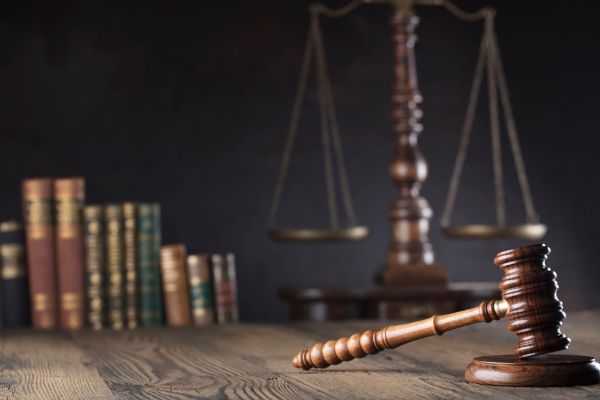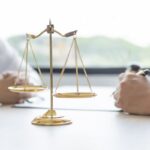Some similarities persist between the law and the society in nature, varying from the dynamics of constituent parts to the ever-evolving characteristics. With its evolution, human society became more dependent or reliable on scientific observation than theological instincts, thus making it a significant source of knowledge and a cause for social control. As it evolved, it divided its horizon further, creating a society with a low collective conscience and more diversified qualities.
This concentric diversification in qualities leads to specific developments and creations that became so attached, making it an inseparable cause of human identity. One such thing that evolved and became an integral part of the individual is the Internet. With the development of society and law, specific changes were made in its use, thus increasing its ambit. New rules were also made around it, and now it controls the crux of every department whatsoever. The Internet is a global network allowing the exchange of data and information worldwide, making a more unified and profound society. It became a source of connectivity and social changes, playing an intense role in social movements and political activism.
The case mentioned here is an example revolving around the same issue, highlighting the curbing of the internet to safeguard from such social movement activity and the imbalance caused by it due to and after the abrogation of Article 370 in the state of Jammu and Kashmir. This article, which came into being after the Delhi agreement between Sheikh Abdullah and the Indian government in 1950, provides the J&K state with the capability to make its constitution and hence bars the Indian government from directly interfering in its state policies.
Before its abrogation, the parliament could only exercise its power in J&K in defense, communication, and external affairs, thus diminishing the effect of government development on the grassroots level. One of the critical features of this article was the non-applicability of centrally passed laws until and unless the state legislature approved the same by passing a parallel act.
A state that was once stated as the “Paradise on Earth” suffered with acts of violence and militancy, causing insufferable pain to the people of J&K and the democracy of India. To eliminate the same, the government in 2019 abolished Article 370 and suspended the internet in the state. Later, two important petitions were filed in the court revolving around this situation, one by a leading journalist of the J&K state, Anuradha Bhasin, regarding the suspension of the internet and the other by the well-known political leader Gulam Nabi Azad,
who was restricted from meeting the members of his constituency when section 144 was imposed following the abrogation. The apex court clubbed these petitions when appealed in the apex court. It delivered this landmark judgment with specific guidelines while issuing suspensions online.
Case details
Case number: writ petition (civil) no. 1031 & writ petition (civil) no. 1164 OF 2019.
Parties: Anuradha Bhasin Versus Union of India and Others. & Ghulam Nabi Azad VersusUnion of India and Anr.
Bench Strength: Three-Judge Bench.
Judges name: justice b.r. Gavai, justice dipankar dutta, AND justice aravind kumar.
Judgment Delivery Date: 10th January, 2020.
Facts of Anuradha Bhasin vs Union of India
- The issue began on August 2, 2019, when the Home Department of the Government of Jammu and Kashmir issued a security advisory. This advisory urged tourists and pilgrims of the Amarnath yatra to shorten their visit and make plans to return home for safety and security. They were following the closure of educational institutions and offices.
- On August 4, the mobile phone network, Internet services, and all the other connections were terminated in the valley. Additionally, restrictions on the movement were imposed.
- On August 5, the President issued Constitutional Order 272, applying all provisions of the Indian constitution to Jammu and Kashmir and modifying Article 367 for the state.
- Later, on August 6, a leading journalist, Ms. Anuradha Bhasin, contended that due to these restrictions, she was unable to publish her editions and approached the court under Article 32 of the Constitution and sought a writ to overturn the decision of shutdown of internet and other restrictions.
- Mr. Gulam Nabi Azad claimed that he was restricted from traveling to his constituency and argued that it hindered his ability to communicate with the people.
When it was listed before the court on September 16, 2019, the court order allowed the visit of Mr. Azad in the districts of (i) Srinagar, (ii) Anantanag, (iii) Baramulla, (iv) Jammu with certain restrictions. He has undertaken before the court that he will not indulge in any political rally or activities during the visit and solely intervene in assessing the impact of the present on the life of daily wage earners.
Issues raised
- Whether the government could claim privilege to escape producing administrative orders issued under section 144 before the court.
- Does the freedom to carry on any trade, occupation, or profession through the Internet come within the domain of Article 19(1) (g)?
- Whether the government was justified in prohibiting access to internet services?Whether the orders issued by the magistrate under section 144 of CrPc were lawful.
- Whether the restrictions imposed by the government had violated the fundamental rights of Ms. Anuradha Bhasin(petitioners).
Arguments
Petitioner’s argument
- The primary contention was the violation to carry one’s trade or business, which is guaranteed under Article 19(1)(g), and freedom of the press as the fourth pillar with the access to speech and expression guaranteed under Article 19(1)(a).
- The second major part of the argument is that the government did not comply with the Telecom Services (public emergency or Public Service) Rules, 2017, as they did not give any appropriate reason for suspending the internet and did not fix any prior deadline.
Further, interlocutory applications were also filled in some instances, challenging the suspension of Internet orders. After accepting specific applications, the SC declined to entertain new interventions due to the time constraints and the nature of the issue.
WRIT PETITION NO. 1031 OF 2019:
- The petitioner pleaded that restrictions on internet services had badly come on print media, and it had a standstill in the state. She also contended that the public order or law was not in danger and the government’s order of suspension was unconstitutional.
- The intervenor argues that the balance needed to be there while attempting to restrict and safeguard national security with the citizens’ rights in the state. They also say that the magistrate was required to announce the news of suspension before the suspension so that the public could raise their grievances and make representations before the authorities.
- The petitioner also argued that the suspension of the Internet should be checked and tested based on a proportionality test. The court should not only consider the social fear and economic loss that they are facing but also the fear of restrictions on the mind of an ordinary citizen.
WRIT PETITION NO. 1164 OF 2019:
This petition was from Mr. Gulam Nabi Azad; he argued that section 144 is imposed whenever there is any internal disturbance or external aggression. However, in this case, there is nothing in the state and the country. Thus, this restriction is unjustified.
- He pleaded that no such threats exist in the country and that the suspension and imposition of section 144 badly damage the state’s trade, businesses, and professions.
- He also pleaded that due to the state’s restrictions, he could not communicate with the people of his constituency. He argued that the limitation should be imposed on the specific person apprehended as a threat, not the whole state.
Intervenor’s arguments
The respondent argued that the internet during the emergency can be a source for spreading misinformation. That’s why it is required to be regulated in such a way. They also respond to the issue of magistrate orders by quoting that the magistrate had issued the notice after analyzing the ground situation.
- The attorney general submitted the background of terrorism in the state and its adverse effects. He responded that it would be foolish of us not to take prevention to cure something. The state would have massive violence if the measures were not taken properly.
- The solicitor general submitted that the first and foremost priority for the state is its citizens; thus, it is required to limit some rights to protect the people. He argued that there are restrictions for specific reasons where there was a history of incitement and violence. At the same time, areas like Ladakh and Jammu in the state have no limits, which shows the proper application of cognizance while applying the restrictions by the magistrate by passing the order.
- The respondent submitted that section 144 can also be imposed for the preventive measures. In this case, movement and internet suspension restricted the use of the Dark Web, which the terrorists use for illegal weapon purchasing.
Responding to the petitioner’s restriction on individuals, the respondent submitted that it is impossible to segregate troublemakers from ordinary citizens in Srinagar.
- The respondent cited the action of 2016 when the Government imposed restrictions on specific sites and continued using others, which resulted in an unsuccessful move for them. Thus, they decided to impose a complete restriction on the services.
Ultimately, they pled that the degree of restriction should be determined by the officers who are well aware of the ground realities and not by the courts.
Judgement of Anuradha Bhasin vs Union of India
- The court directed that it is necessary to restrict to avoid incumbency, but the restriction should not be arbitrary and excessive. They ordered the government to publish or notify the suspension in the public domain.
- The court pointed out that the government cannot pass rules and restrictions on mere apprehension of danger. I am citing the judgment of Ram Jethmalani Vs. UOI, the court said that the information about the limitation should be in the public domain, as Article 19, which talks about freedom of speech and expression, also encompasses the right to information.
- The court directed the state to present all the orders that led to the suspension of internet and emergency. They also ordered the testing of proportionality to be satisfied so that there was no violation of natural justice.
- The court accepted the significance of the Internet and its use in trade and business practice and ordered the restoration of the same with proper measures and assurance. They recognized the freedom to trade and practice and the freedom of speech and expression over the internet as a fundamental right embodied under Article 19(1)(a).
- The court stated that the restriction should be under the doctrine of proportionality and reasonable. The doctrine implies that the government’s orders and the people to whom restrictions are caused by hampering their rights should be consonant. It should be arbitrary and excessive.
- The suspension under Telecom Services (Public Emergency and Public Services) Rules, 2017, should be for a temporary duration and in adherence to the principle of proportionality. Such suspensions are under the ambit of judicial review in any circumstances.
- The government also allowed government websites, e-banking facilities, hospital services, and other essential services to be restored immediately. The court directed the state competent authorities to review all the orders passed under sec 144 of Cr. P.C. followed the law laid down by the court through his case.
Legal-socio analysis
A few irreplaceable things drive this positivist stage of human existence. They are not mere tools but a source of food and existence. Sociologists do not see the world in a very different way. Society evolved, the people became, and the needs changed. Previously, rights were not as significant in one’s life, but now they are unattachable in existing organisms. Some people started pushing their rights to a new limit and made it a form of terrorism for others. We sometimes quote, “One person’s revolution is another person’s terrorism.” But this revolution came so far in the land of Kashmir that it needed to be eradicated at any cost. It is not only taking the lives of people but also damaging their thinking and social ability. They control their need, their speech, and their action in society by brainwashing them and lining them with manipulative thoughts and questions, making them rebels for their use. The curbing of the internet and imposition of emergency was for social good. The court accepted the situation quo in the state and upheld the individual’s right and access.
Some of the legal-social changes that arise after the pronouncement of judgments are:
Internet as a fundamental right
The judgment signified and recognized the internet as a crucial source for exercising trade practices and freedom of speech. It highlighted its need in the increasingly digital world and its role in modern democratic societies.
Balancing security and rights
This case highlighted the tension in managing state security and individual rights. Though the state’s responsibilities in managing the status quo are appreciated in the judgment, it also emphasizes the need to not infringe on one’s right without any appropriately stated reason and limitation.
Role of the principle of proportionality
The court stated that the principle is required to safeguard one against excessive state action, ensuring that the restrictions and the least intrusive means to achieve the intended goal are needed.
Procedural safeguard and accountability
The court stresses the procedural safeguard to prevent arbitrary use of Power. The court aimed to enhance transparency and accountability in the government’s approach by periodically reviewing and publishing the Suspension Order. It is necessary in a democratic country to continuously review the power and discretion to be relevant in the world. This action will
make the country’s citizens more responsible and informed about democracy and its robustness.
Impact on media and journalism
The case highlighted the adverse effect of internet shutdown on communication and media freedom. Media is referred to as the 4th pillar of democracy, and their ability to gather and disseminate information and act as a watchdog of democracy was heavily affected by the shutdown. Those on the ground who take social responsibilities and perform social duties must be protected from autocratic and traditional authority.
Socio-economic implication
The prolonged internet shutdown heavily disrupted education, healthcare, and daily life in Jammu and Kashmir. The court emphasizes its adverse effect on economics and social activities. The life of J&K people is majorly dependent on the tourism sector and daily wages, which have gone down in restriction. The court accepted and ordered the restoration of normalcy in the state as soon as possible.
Conclusion
The Anuradha Bhasin vs. Union of India case dealt with the government’s decision to suspend internet services and restrict movement in Jammu and Kashmir after the abrogation of Article 370 in August 2019. This legal action aimed to maintain security but raised significant concerns about fundamental rights.
The Supreme Court, in its judgment delivered on January 10, 2020, highlighted several critical points. Firstly, it recognized internet access as an essential part of the right to freedom of speech and expression under Article 19(1)(a) of the Indian Constitution, acknowledging its role in modern trade, communication, and media. The Court underscored that any restrictions on internet services must adhere to the principles of necessity and proportionality, ensuring they are not arbitrary or excessive.
Furthermore, the Court mandated that all orders regarding internet shutdowns and movement restrictions be made public to enhance transparency and accountability. This requirement ensures that such decisions can be challenged and reviewed judicially, safeguarding citizens against misuse of power. The judgment also stressed the need for periodic reviews of suspension orders to prevent prolonged and unjustified restrictions.
The Court recognized the adverse impact of internet shutdowns on media freedom and journalism, which are vital for a functioning democracy. The decision to curtail internet
services had severely affected the ability of journalists like Anuradha Bhasin to operate, undermining the press’s role as the fourth pillar of democracy.
Additionally, the Court addressed the imposition of Section 144 of the Criminal Procedure Code, emphasizing that such measures should not be applied broadly without sufficient justification. The state must balance security concerns with individual rights, ensuring that restrictions are the least intrusive means necessary to achieve the intended security goals.
In conclusion, the Supreme Court’s judgment reinforced the importance of protecting fundamental rights while addressing national security issues, highlighting the need for a balanced, transparent, and accountable approach in a democratic society.
REFERENCES
- ANURADHA BHASIN vs. UNION OF INDIA AND ORS. (2020). https://main.sci.gov.in/supremecourt/2019/28817/28817_2019_2_1501_19350_Judgement_10-Jan- 2020.pdf
- Kaushik, S. (no date) ‘Anuradha Bhasin v. Union of India, 2020 : case analysis’. Available at: https://blog.ipleaders.in/anuradha-bhasin-v-union-of-india-case-analysis/ (Accessed: 15 September 2024).
- ‘Bhasin v. Union of India’ (no date). Available at: https://globalfreedomofexpression.columbia.edu/cases/bhasin-v-union-of-india/ (Accessed: 15 September 2024).
Author: Akarsh Raj, 2nd year BSc.Llb student from National Forensic Sciences University, Gandhinagar, Gujarat.






